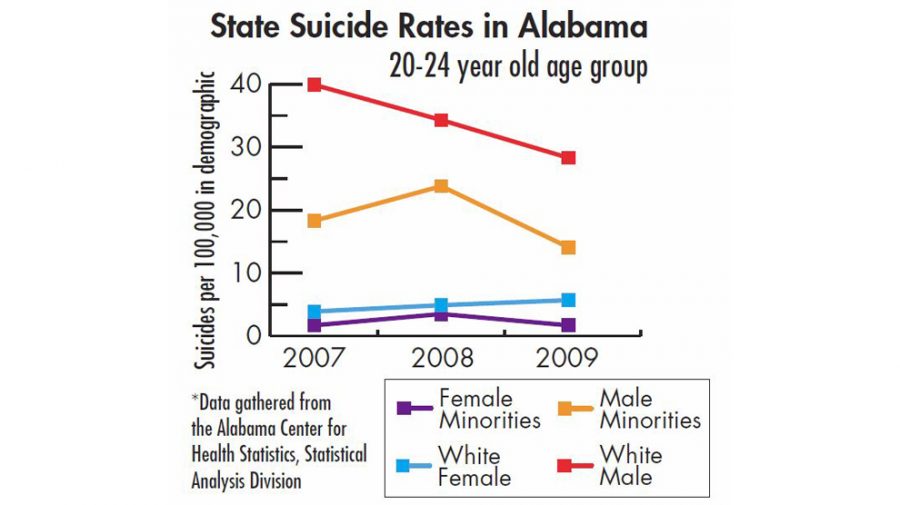The national average for school suicides is 7.29 per year for every 100,000 students, according to Paula Clayton, medical director of the American Foundation for Suicide Prevention in a recent CNN story on suicides at Cornell University. A school the size of the University of Alabama would have approximately two suicides per year according to that average. However, since December, The Crimson White has learned of four suspected suicides among UA students.
The Family Therapist
Ed Pendergrass, a family therapist who practiced for 18 years, said the three leading reasons behind suicide for college students include breaking up with a significant other, sensing failure and dealing with family problems back home.
“In my experience, the biggest reason for a student to commit suicide is a break up with a significant other,” he said. “A lot of college students can benefit from an anti-depressant, because despite the stereotype about the medicine being for people who can’t even get out of bed in the morning, there are really good ones out with minimal side effects.”
Pendergrass said it is hard to differentiate between someone who will commit suicide and someone who won’t, so one should always take a suicide threat seriously.
“If you have friends who are talking about depression, that’s the time to be nosy,” he said. “You don’t want them to turn hopeless.”
Typically, candidates will show a combination of depression, anger and hopelessness, Pendergrass said.
“A bunch of anger is when we get concerned,” he said. “For example, someone who would hang themselves in a dorm or apartment is trying to make a statement many times. Suicide is a selfish act, because the person knows someone is going to find them like that, and it will be traumatic.
“Everyone at some point in life is going to feel hopeless,” he said. “People may even begin to have those thoughts that life is not worth living. If you can get your friends to talk about these thoughts, that is a positive thing.”
He said college students have a tendency to overdramatize situations such as a breakup or their grades to a point that can threaten their lives.
“When your friends start pulling away and losing interest in things they have normally shown interest in, like they stop going to class, that is the time to be a pest,” Pendergrass said. “Take it seriously and make them go to see their family physician.”
Pendergrass has also faced survivor guilt, an emotion that loved ones begin to feel after someone commits suicide.
“Suicide is so devastating for survivors,” Pendergrass said. “You must remember, if someone really wants to take their life, you can’t stop them.”
The Friend
Steve Keogh, a freshman majoring in telecommunications and film, is a friend of a UA student who committed suicide within the past few months.
“After we found out [UA student] killed himself, I was pretty pissed, you know?” Keogh said. “It seemed almost spiteful to his friends that he would abandon us like that without letting us know what was going on.”
Keogh said he is getting a little better now, and while he is not to the point of acceptance yet, it doesn’t hurt as much.
“I realized what he did in the last 15 minutes of his life is between him and God,” he said. “We should remember him for the last 18 years and not those few minutes.”
Keogh said he missed a lot of class due to grieving and travelling out of state for his friend’s funeral.
“I’m still catching up with my schoolwork,” he said.
Keogh said opportunities for support are available to those who need it.
“There is the counseling center, but also let your friends know what is going on,” he said. “If they are really your friends, they won’t judge you.”
He said when suicide seems like the only option, “you need to take a better look around.”
“It’s so silly and selfish,” he said. “It’s not just letting go. It’s actively hurting those that care about you. It’s a middle finger to those who love you.”
He said that there needs to be more suicide awareness at the University.
“It would’ve been really, really hard to see a story about it [in The Crimson White], but at the same time, it seems almost worse to cover it up,” Keogh said.
The Pastor
Brother Roger Phillips, an evangelical Christian pastor, was a mentor to another student who committed suicide in the past four months. He baptized the young man, performed his wedding ceremony and shared a very close relationship with him.
“Suicide isn’t something that’s chosen,” Phillips said. “It’s something that happens when someone’s pain exceeds the ability to deal with the pain they are given. What drives someone to suicide? Perhaps it’s where the terrible pain and agony someone is going through eventually becomes so overpowering it overtakes them.”
He compares suicide to a drug addiction, a situation in which the drive to continue abusing is greater than one’s tendency to protect himself or herself from it and abstain.
Phillips said there is a certain stigma attached to suicide because of its very nature.
“The perception comes from the finality of it,” Phillips said. “ Suicide is very pronounced, and since that person’s life is ended at that point and they’re not able to ask for forgiveness, some think you’ve eliminated the possibility of forgiveness.”
However, he said that biblically, there is no mention that suicide is the unforgivable sin.
“Several people in the Bible did commit suicide and the only unforgiveable sin is the failure to accept Christ,” Phillps said. “We can’t go back, and we can’t change anything. It’s kind of an exercise in futility to wonder what we could have done. Instead, we need to look at those who are struggling today and see how we can make a difference. I can’t help that young man anymore, but I can help his family and his widow.”
Phillips said the main thing someone considering suicide should do is turn to someone.
“You’re not alone,” he said. “There are caring friends, loving relatives and trained professionals who have a great sense of concern about people in that situation.”
He said to also try to negotiate a treaty when you reach that point of desperation.
“Give yourself a 24-hour period where you’ll agree not to take any action at all,” Phillips said. “In ending your own life, you will never experience that relief. No feelings will exist after that.”
This is part one of a two-part series. Read Wednesday’s paper for a feature on how Cornell University is coping with a large number of suicides this year.







